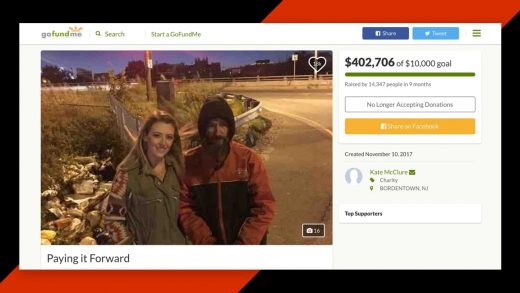Plot twist: The $400,000 GoFundMe for a homeless man was all a scam
At the time, the story read like a miracle of human generosity, but a year after the fact, we’re now learning that it was, in fact, perfectly orchestrated to tug on heartstrings in the way that it did. McClure, Bobbitt, and D’Amico are now reportedly all under arrest for fabricating the story, and facing charges of conspiracy and theft by deception. In short, they made the whole thing up.
Suspicions about the GoFundMe, called “Paying it Forward,” began to swirl this summer. As the Philadelphia Inquirer first reported in August, the couple initially told donors they’d set up a trust for Bobbitt to manage his money. That’s where things started to get weird. Bobbitt hired a pro-bono attorney, who announced that instead of the full $402,000, Bobbitt only received $75,000, which he used for a camper and an SUV, instead of actual housing.
What happened to the rest of the balance? Bobbitt reportedly believed the New Jersey-based couple was spending it on themselves, citing recent lavish trips, a new BMW, and some gambling. McClure and D’Amico denied that, telling the Inquirer they’d withheld a large share of it because Bobbitt was spending irresponsibly and had a drug problem, something Bobbitt has worked to beat and not disputed.
In late August, a New Jersey judge settled the matter by ruling that all remaining GoFundMe donations should be deposited in a trust overseen by Bobbitt’s legal team. But then McClure and D’Amico changed their story, stating through legal counsel that there was no money left. In early September, the Burlington County prosecutors and Florence Township police obtained a warrant and searched the couple’s New Jersey home for clues, while a judge ordered them to appear in court and properly explain the money trail.
These investigations ultimately led to the current criminal complaint first obtained by NBC Philadelphia. “Investigators say the three deliberately prevented donors for their GoFundMe campaign from gaining information ‘that would affect their judgment about solicited contribution to that fundraising effort,’” the station reports.
For GoFundMe, the entire case was already a test of its broad online guarantee that protects both donors and recipients who might get defrauded. “In the rare case that something isn’t right, we will refund your donation,” notes one disclaimer. “If funds aren’t delivered to the right person, we will donate the missing amount,” says another.
Before the new allegations came to light, a GoFundMe spokesperson previously told Fast Company that Bobbitt would be “made whole and we’re committing that he’ll get the balance of the funds that he has not yet received or benefitted from.” This included an immediate delivery of $20,000 in stopgap funding so that Bobbitt wasn’t penniless as things were being sorted out.
It’s unclear if that money still exists or has been returned to the company. Early on, GoFundMe reportedly collected around $30,000 in fees from the campaign because at the time it took 5% per transaction and another 2.9% for payment processing as a standard business practice. The company has since changed models, allowing donors to leave tips for the service during campaigns.
As for the 14,325 total people who were deceived, it’s time to make good on that corporate refund policy. “All donors who contributed to this GoFundMe campaign will receive a full refund,” says GoFundMe spokesperson Bobby Whithorne in an email to Fast Company. “GoFundMe always fully protects donors, which is why we have a comprehensive refund policy in place.” The exact timeline for that isn’t clear but will be “in the coming days” ahead.
“While this type of behavior by an individual is extremely rare, it’s unacceptable and clearly it has consequences,” he adds. “Committing fraud, whether it takes place on or offline is against the law. We are fully cooperating and assisting law enforcement officials to recover every dollar withdrawn by Ms. McClure and Mr. D’Amico.”
In general, Whithorne says that platform issues of “misuse” affect “less than one tenth of one percent of all campaigns.” As the current situation clearly demonstrates, that can still cost donors a lot of money. Until today, the original GoFundMe campaign was left on the site so that anyone wondering what the heck happened could retrace it. But criminal activity was the death knell for the campaign’s place on the GoFundMe website. “It’s simply standard policy to remove fraudulent campaigns from the platform,” Whithorne says.
(22)



